Sasol Case Study: Globalisation, Leadership, and Strategic Challenges
VerifiedAdded on 2023/06/10
|18
|3765
|386
Report
AI Summary
This report analyses the impact of globalisation on Sasol, a global energy and chemical company headquartered in South Africa. It examines various factors such as cost, market dynamics, competition, and the environment, including political, economic, social, technological, legal, and environmental influences on Sasol's operations. The report further explores the challenges and opportunities associated with international business, including legal frameworks and management complexities. It delves into the influence of globalisation on organisational leadership, governance, culture, structure, and functions within Sasol, utilising the McKinsey 7's model to assess the company's strategic alignment. The report also discusses the impact of sustainable and ethical globalisation on Sasol's operations and decision-making processes. Desklib provides access to similar solved assignments and resources for students.
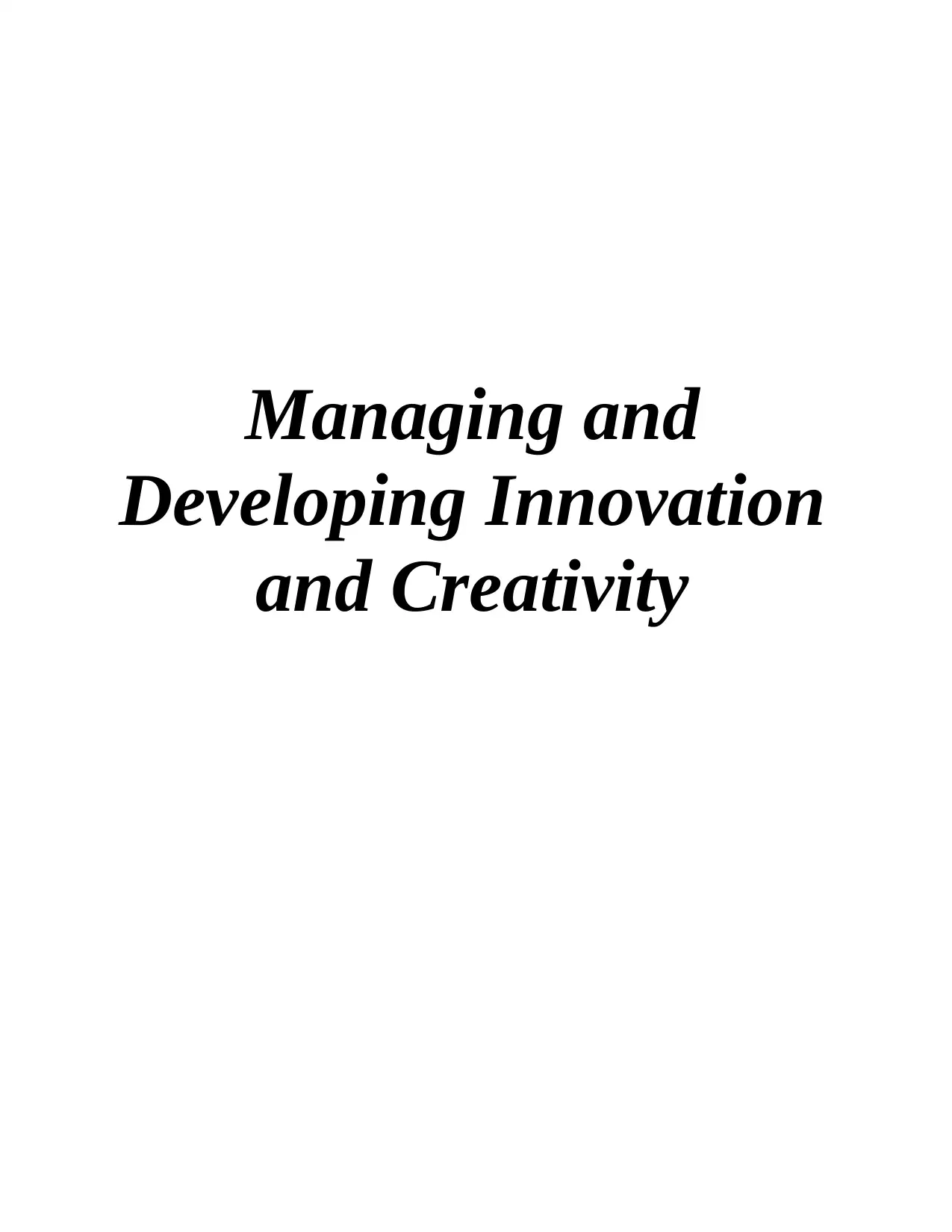
Managing and
Developing Innovation
and Creativity
Developing Innovation
and Creativity
Paraphrase This Document
Need a fresh take? Get an instant paraphrase of this document with our AI Paraphraser
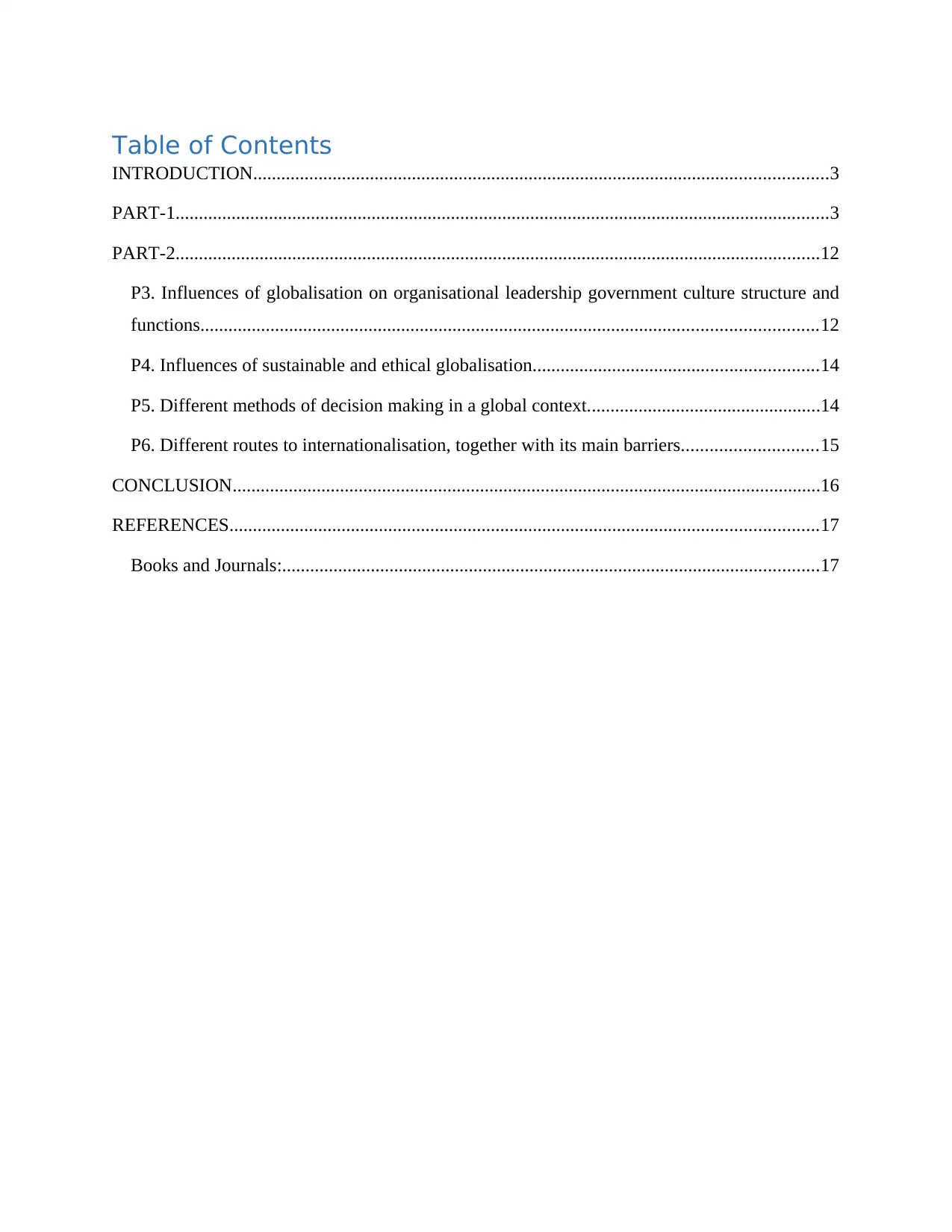
Table of Contents
INTRODUCTION...........................................................................................................................3
PART-1............................................................................................................................................3
PART-2..........................................................................................................................................12
P3. Influences of globalisation on organisational leadership government culture structure and
functions....................................................................................................................................12
P4. Influences of sustainable and ethical globalisation.............................................................14
P5. Different methods of decision making in a global context..................................................14
P6. Different routes to internationalisation, together with its main barriers.............................15
CONCLUSION..............................................................................................................................16
REFERENCES..............................................................................................................................17
Books and Journals:...................................................................................................................17
INTRODUCTION...........................................................................................................................3
PART-1............................................................................................................................................3
PART-2..........................................................................................................................................12
P3. Influences of globalisation on organisational leadership government culture structure and
functions....................................................................................................................................12
P4. Influences of sustainable and ethical globalisation.............................................................14
P5. Different methods of decision making in a global context..................................................14
P6. Different routes to internationalisation, together with its main barriers.............................15
CONCLUSION..............................................................................................................................16
REFERENCES..............................................................................................................................17
Books and Journals:...................................................................................................................17
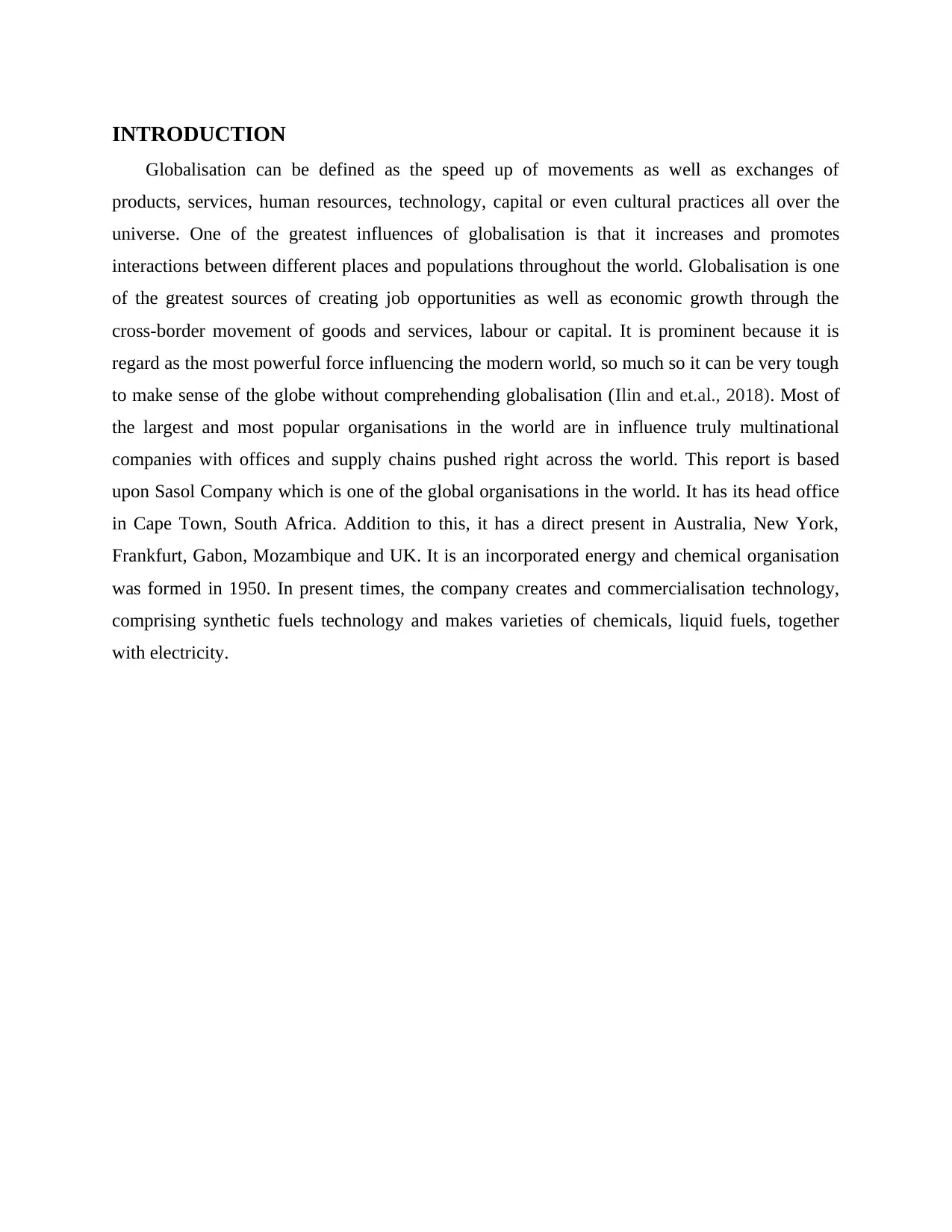
INTRODUCTION
Globalisation can be defined as the speed up of movements as well as exchanges of
products, services, human resources, technology, capital or even cultural practices all over the
universe. One of the greatest influences of globalisation is that it increases and promotes
interactions between different places and populations throughout the world. Globalisation is one
of the greatest sources of creating job opportunities as well as economic growth through the
cross-border movement of goods and services, labour or capital. It is prominent because it is
regard as the most powerful force influencing the modern world, so much so it can be very tough
to make sense of the globe without comprehending globalisation (Ilin and et.al., 2018). Most of
the largest and most popular organisations in the world are in influence truly multinational
companies with offices and supply chains pushed right across the world. This report is based
upon Sasol Company which is one of the global organisations in the world. It has its head office
in Cape Town, South Africa. Addition to this, it has a direct present in Australia, New York,
Frankfurt, Gabon, Mozambique and UK. It is an incorporated energy and chemical organisation
was formed in 1950. In present times, the company creates and commercialisation technology,
comprising synthetic fuels technology and makes varieties of chemicals, liquid fuels, together
with electricity.
Globalisation can be defined as the speed up of movements as well as exchanges of
products, services, human resources, technology, capital or even cultural practices all over the
universe. One of the greatest influences of globalisation is that it increases and promotes
interactions between different places and populations throughout the world. Globalisation is one
of the greatest sources of creating job opportunities as well as economic growth through the
cross-border movement of goods and services, labour or capital. It is prominent because it is
regard as the most powerful force influencing the modern world, so much so it can be very tough
to make sense of the globe without comprehending globalisation (Ilin and et.al., 2018). Most of
the largest and most popular organisations in the world are in influence truly multinational
companies with offices and supply chains pushed right across the world. This report is based
upon Sasol Company which is one of the global organisations in the world. It has its head office
in Cape Town, South Africa. Addition to this, it has a direct present in Australia, New York,
Frankfurt, Gabon, Mozambique and UK. It is an incorporated energy and chemical organisation
was formed in 1950. In present times, the company creates and commercialisation technology,
comprising synthetic fuels technology and makes varieties of chemicals, liquid fuels, together
with electricity.
⊘ This is a preview!⊘
Do you want full access?
Subscribe today to unlock all pages.

Trusted by 1+ million students worldwide
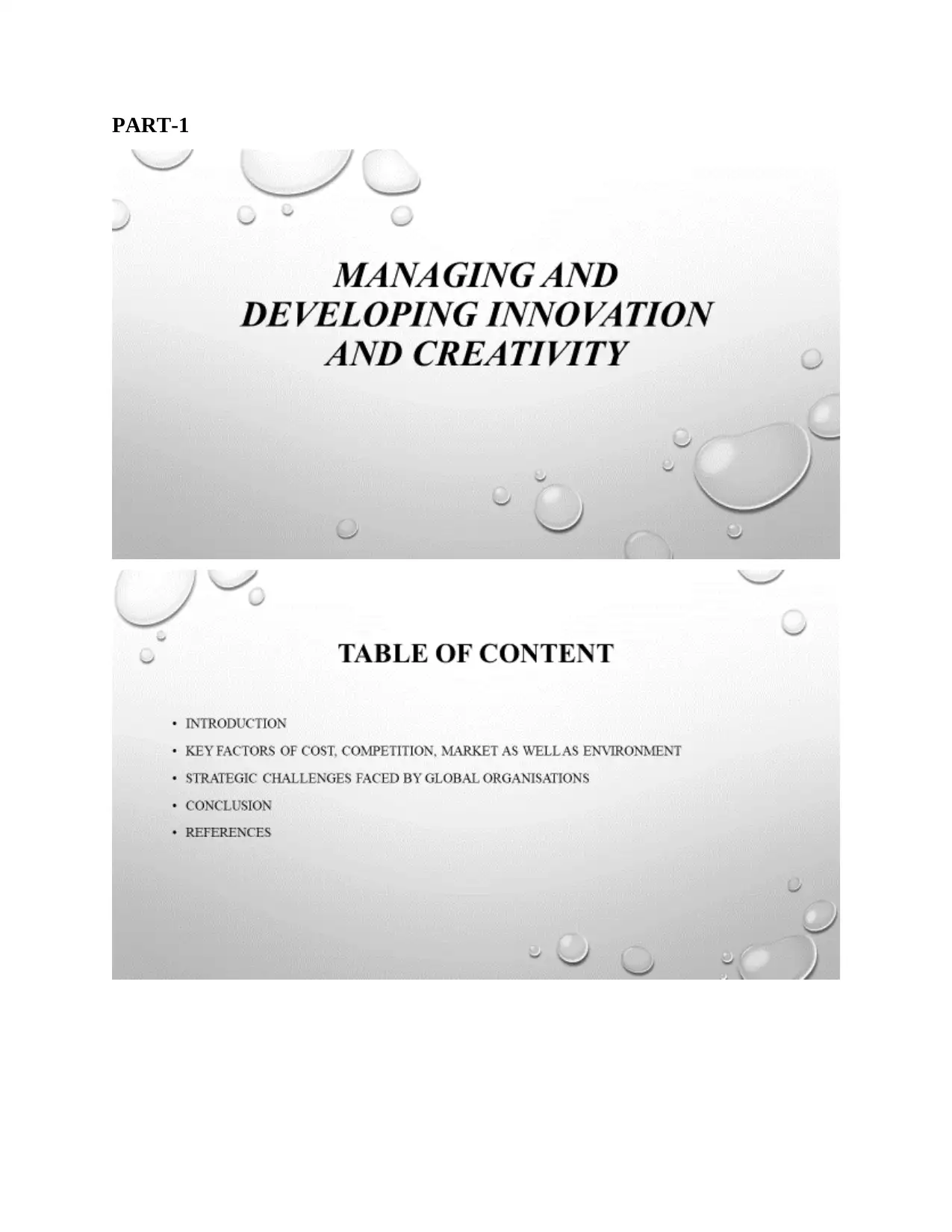
PART-1
Paraphrase This Document
Need a fresh take? Get an instant paraphrase of this document with our AI Paraphraser
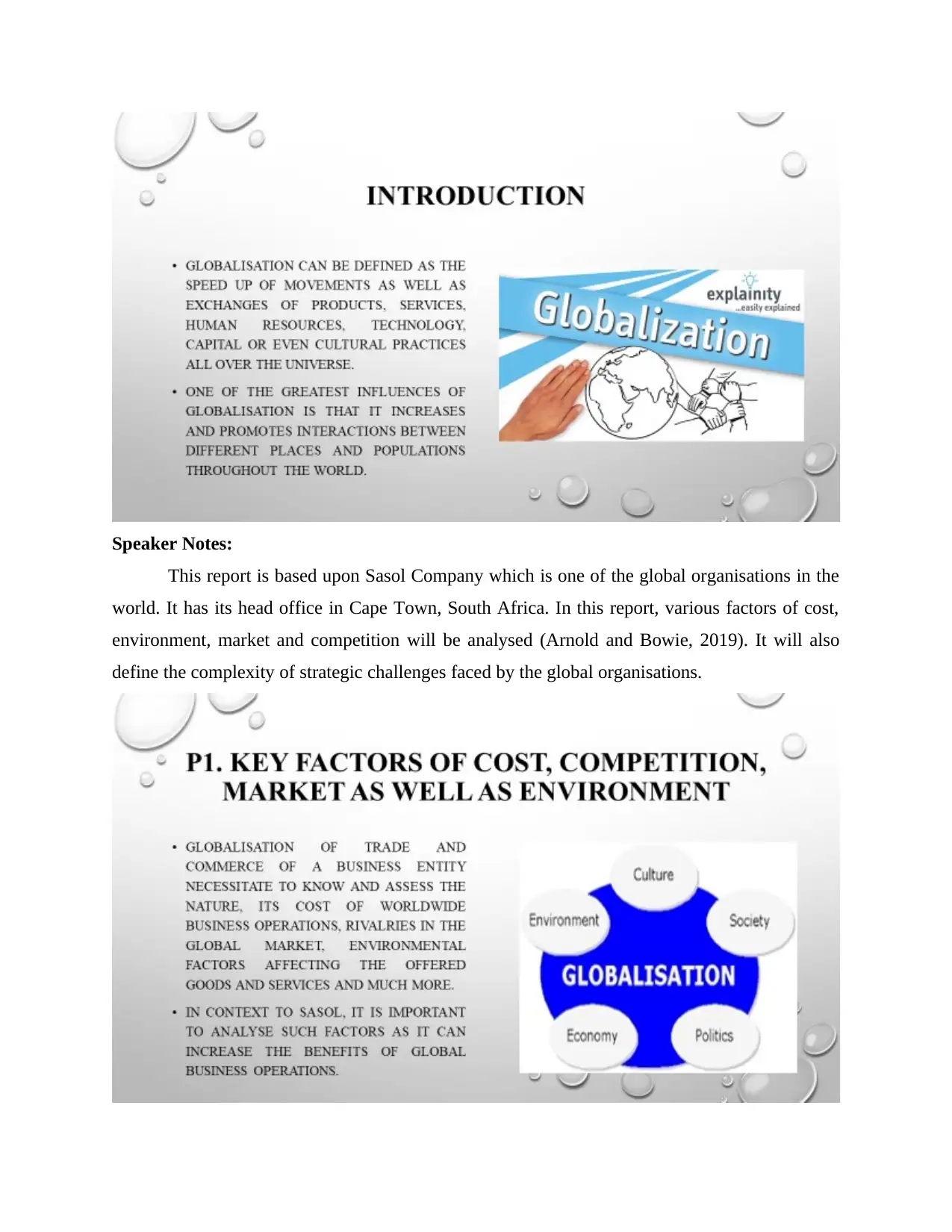
Speaker Notes:
This report is based upon Sasol Company which is one of the global organisations in the
world. It has its head office in Cape Town, South Africa. In this report, various factors of cost,
environment, market and competition will be analysed (Arnold and Bowie, 2019). It will also
define the complexity of strategic challenges faced by the global organisations.
This report is based upon Sasol Company which is one of the global organisations in the
world. It has its head office in Cape Town, South Africa. In this report, various factors of cost,
environment, market and competition will be analysed (Arnold and Bowie, 2019). It will also
define the complexity of strategic challenges faced by the global organisations.
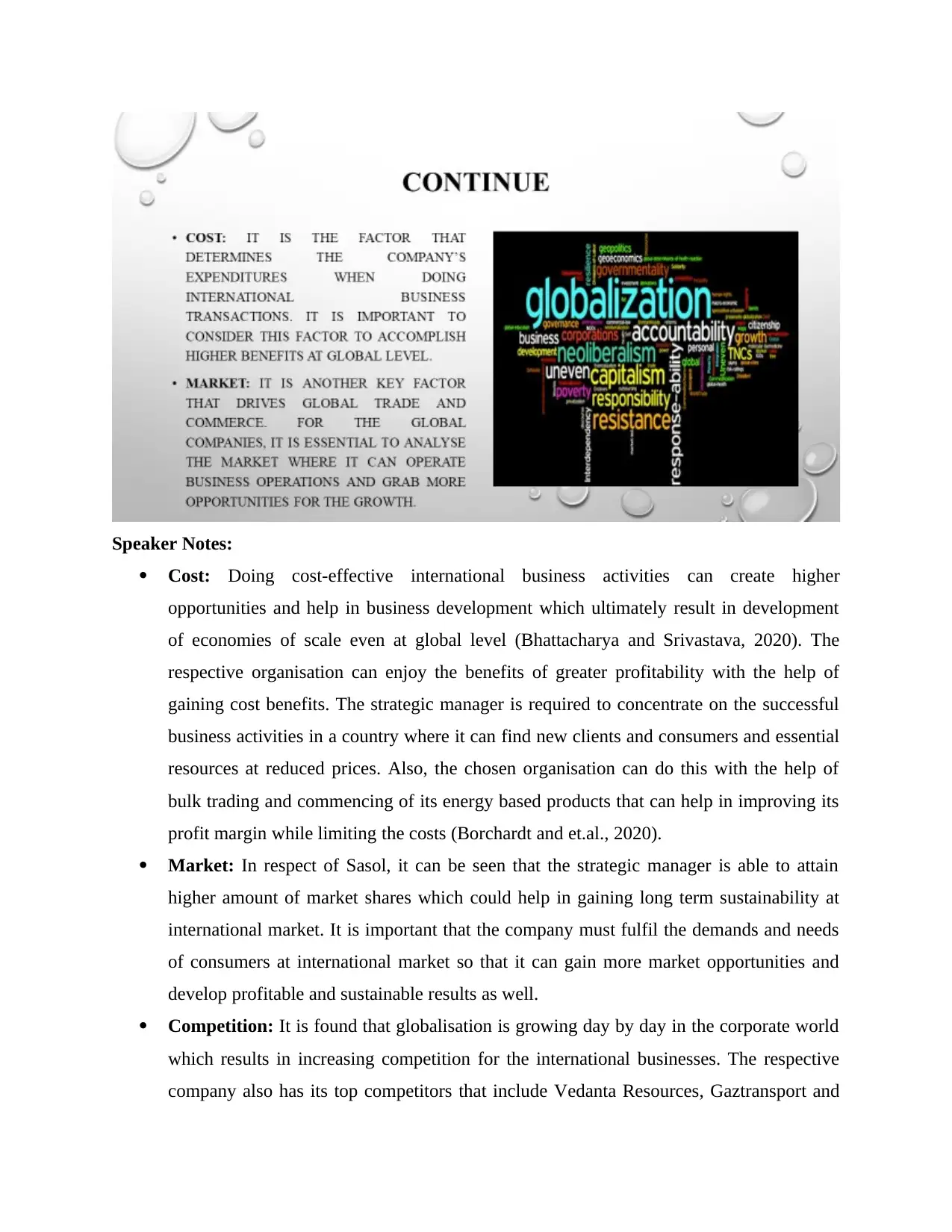
Speaker Notes:
Cost: Doing cost-effective international business activities can create higher
opportunities and help in business development which ultimately result in development
of economies of scale even at global level (Bhattacharya and Srivastava, 2020). The
respective organisation can enjoy the benefits of greater profitability with the help of
gaining cost benefits. The strategic manager is required to concentrate on the successful
business activities in a country where it can find new clients and consumers and essential
resources at reduced prices. Also, the chosen organisation can do this with the help of
bulk trading and commencing of its energy based products that can help in improving its
profit margin while limiting the costs (Borchardt and et.al., 2020).
Market: In respect of Sasol, it can be seen that the strategic manager is able to attain
higher amount of market shares which could help in gaining long term sustainability at
international market. It is important that the company must fulfil the demands and needs
of consumers at international market so that it can gain more market opportunities and
develop profitable and sustainable results as well.
Competition: It is found that globalisation is growing day by day in the corporate world
which results in increasing competition for the international businesses. The respective
company also has its top competitors that include Vedanta Resources, Gaztransport and
Cost: Doing cost-effective international business activities can create higher
opportunities and help in business development which ultimately result in development
of economies of scale even at global level (Bhattacharya and Srivastava, 2020). The
respective organisation can enjoy the benefits of greater profitability with the help of
gaining cost benefits. The strategic manager is required to concentrate on the successful
business activities in a country where it can find new clients and consumers and essential
resources at reduced prices. Also, the chosen organisation can do this with the help of
bulk trading and commencing of its energy based products that can help in improving its
profit margin while limiting the costs (Borchardt and et.al., 2020).
Market: In respect of Sasol, it can be seen that the strategic manager is able to attain
higher amount of market shares which could help in gaining long term sustainability at
international market. It is important that the company must fulfil the demands and needs
of consumers at international market so that it can gain more market opportunities and
develop profitable and sustainable results as well.
Competition: It is found that globalisation is growing day by day in the corporate world
which results in increasing competition for the international businesses. The respective
company also has its top competitors that include Vedanta Resources, Gaztransport and
⊘ This is a preview!⊘
Do you want full access?
Subscribe today to unlock all pages.

Trusted by 1+ million students worldwide
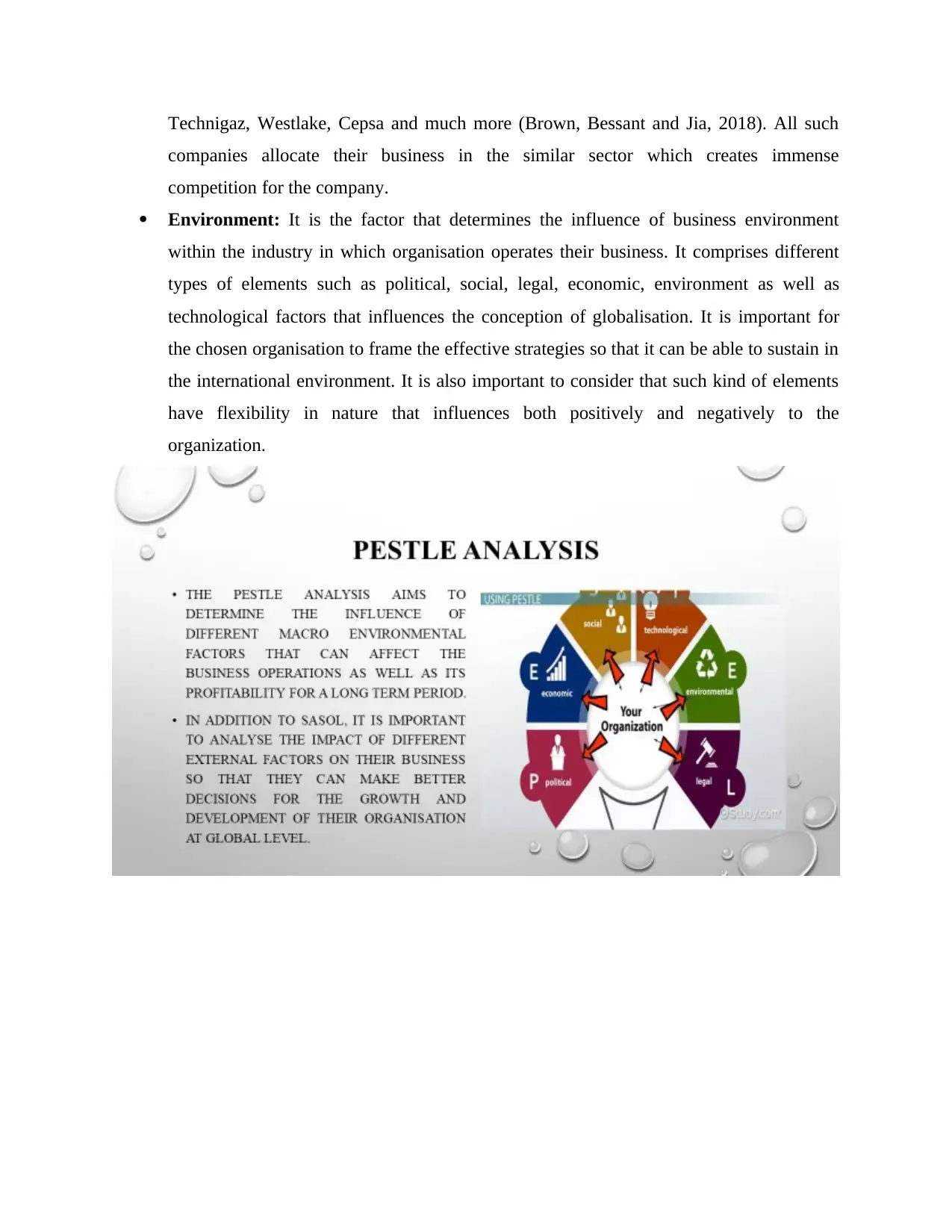
Technigaz, Westlake, Cepsa and much more (Brown, Bessant and Jia, 2018). All such
companies allocate their business in the similar sector which creates immense
competition for the company.
Environment: It is the factor that determines the influence of business environment
within the industry in which organisation operates their business. It comprises different
types of elements such as political, social, legal, economic, environment as well as
technological factors that influences the conception of globalisation. It is important for
the chosen organisation to frame the effective strategies so that it can be able to sustain in
the international environment. It is also important to consider that such kind of elements
have flexibility in nature that influences both positively and negatively to the
organization.
companies allocate their business in the similar sector which creates immense
competition for the company.
Environment: It is the factor that determines the influence of business environment
within the industry in which organisation operates their business. It comprises different
types of elements such as political, social, legal, economic, environment as well as
technological factors that influences the conception of globalisation. It is important for
the chosen organisation to frame the effective strategies so that it can be able to sustain in
the international environment. It is also important to consider that such kind of elements
have flexibility in nature that influences both positively and negatively to the
organization.
Paraphrase This Document
Need a fresh take? Get an instant paraphrase of this document with our AI Paraphraser
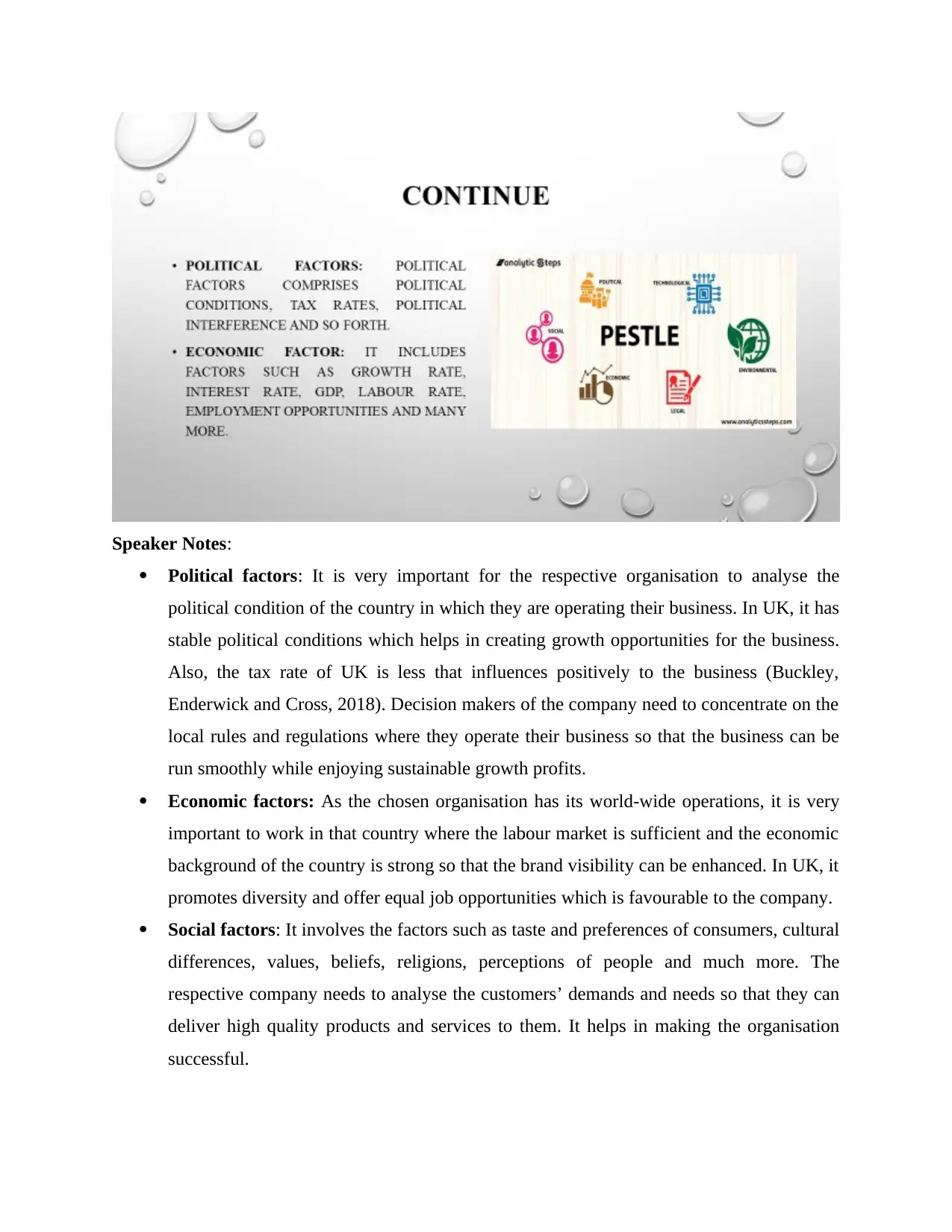
Speaker Notes:
Political factors: It is very important for the respective organisation to analyse the
political condition of the country in which they are operating their business. In UK, it has
stable political conditions which helps in creating growth opportunities for the business.
Also, the tax rate of UK is less that influences positively to the business (Buckley,
Enderwick and Cross, 2018). Decision makers of the company need to concentrate on the
local rules and regulations where they operate their business so that the business can be
run smoothly while enjoying sustainable growth profits.
Economic factors: As the chosen organisation has its world-wide operations, it is very
important to work in that country where the labour market is sufficient and the economic
background of the country is strong so that the brand visibility can be enhanced. In UK, it
promotes diversity and offer equal job opportunities which is favourable to the company.
Social factors: It involves the factors such as taste and preferences of consumers, cultural
differences, values, beliefs, religions, perceptions of people and much more. The
respective company needs to analyse the customers’ demands and needs so that they can
deliver high quality products and services to them. It helps in making the organisation
successful.
Political factors: It is very important for the respective organisation to analyse the
political condition of the country in which they are operating their business. In UK, it has
stable political conditions which helps in creating growth opportunities for the business.
Also, the tax rate of UK is less that influences positively to the business (Buckley,
Enderwick and Cross, 2018). Decision makers of the company need to concentrate on the
local rules and regulations where they operate their business so that the business can be
run smoothly while enjoying sustainable growth profits.
Economic factors: As the chosen organisation has its world-wide operations, it is very
important to work in that country where the labour market is sufficient and the economic
background of the country is strong so that the brand visibility can be enhanced. In UK, it
promotes diversity and offer equal job opportunities which is favourable to the company.
Social factors: It involves the factors such as taste and preferences of consumers, cultural
differences, values, beliefs, religions, perceptions of people and much more. The
respective company needs to analyse the customers’ demands and needs so that they can
deliver high quality products and services to them. It helps in making the organisation
successful.
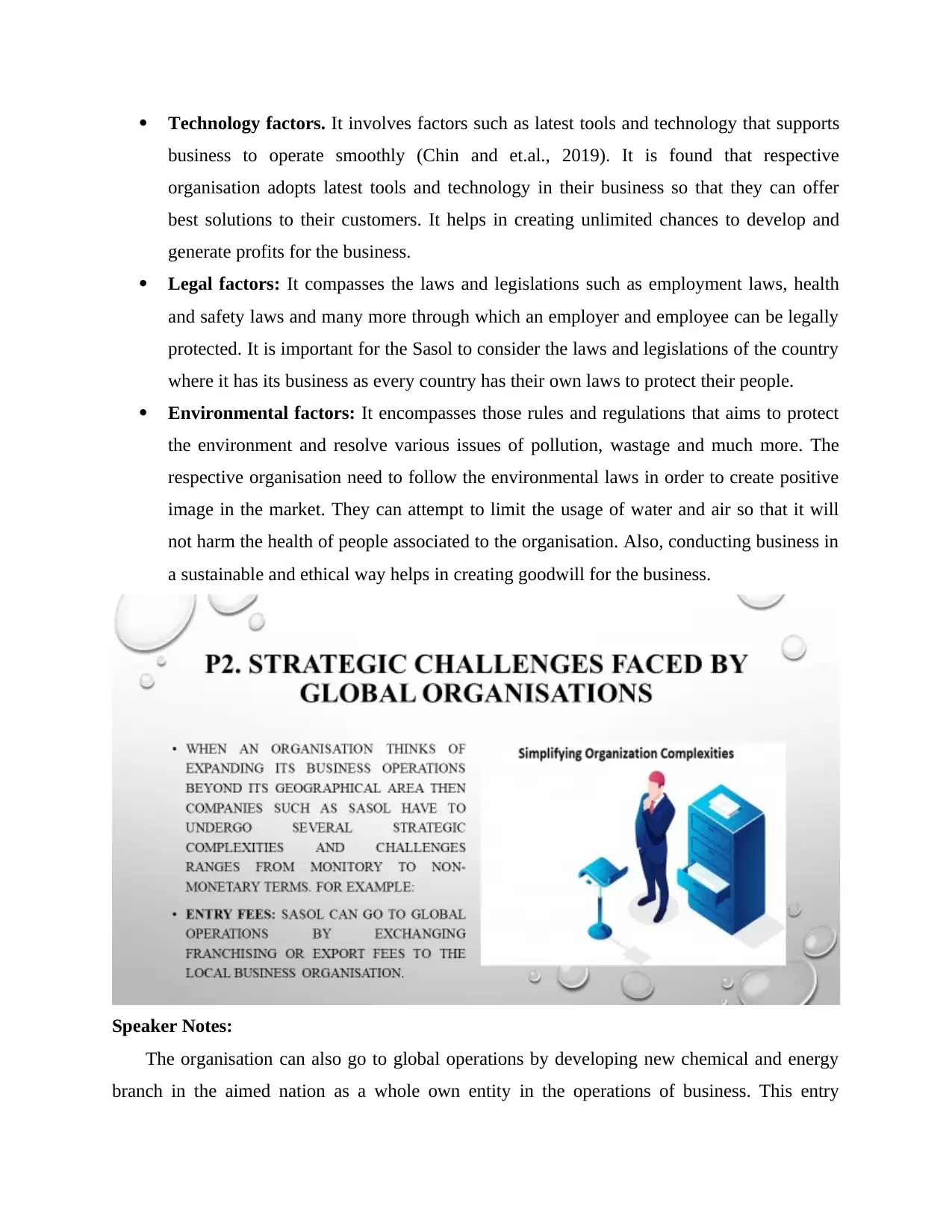
Technology factors. It involves factors such as latest tools and technology that supports
business to operate smoothly (Chin and et.al., 2019). It is found that respective
organisation adopts latest tools and technology in their business so that they can offer
best solutions to their customers. It helps in creating unlimited chances to develop and
generate profits for the business.
Legal factors: It compasses the laws and legislations such as employment laws, health
and safety laws and many more through which an employer and employee can be legally
protected. It is important for the Sasol to consider the laws and legislations of the country
where it has its business as every country has their own laws to protect their people.
Environmental factors: It encompasses those rules and regulations that aims to protect
the environment and resolve various issues of pollution, wastage and much more. The
respective organisation need to follow the environmental laws in order to create positive
image in the market. They can attempt to limit the usage of water and air so that it will
not harm the health of people associated to the organisation. Also, conducting business in
a sustainable and ethical way helps in creating goodwill for the business.
Speaker Notes:
The organisation can also go to global operations by developing new chemical and energy
branch in the aimed nation as a whole own entity in the operations of business. This entry
business to operate smoothly (Chin and et.al., 2019). It is found that respective
organisation adopts latest tools and technology in their business so that they can offer
best solutions to their customers. It helps in creating unlimited chances to develop and
generate profits for the business.
Legal factors: It compasses the laws and legislations such as employment laws, health
and safety laws and many more through which an employer and employee can be legally
protected. It is important for the Sasol to consider the laws and legislations of the country
where it has its business as every country has their own laws to protect their people.
Environmental factors: It encompasses those rules and regulations that aims to protect
the environment and resolve various issues of pollution, wastage and much more. The
respective organisation need to follow the environmental laws in order to create positive
image in the market. They can attempt to limit the usage of water and air so that it will
not harm the health of people associated to the organisation. Also, conducting business in
a sustainable and ethical way helps in creating goodwill for the business.
Speaker Notes:
The organisation can also go to global operations by developing new chemical and energy
branch in the aimed nation as a whole own entity in the operations of business. This entry
⊘ This is a preview!⊘
Do you want full access?
Subscribe today to unlock all pages.

Trusted by 1+ million students worldwide
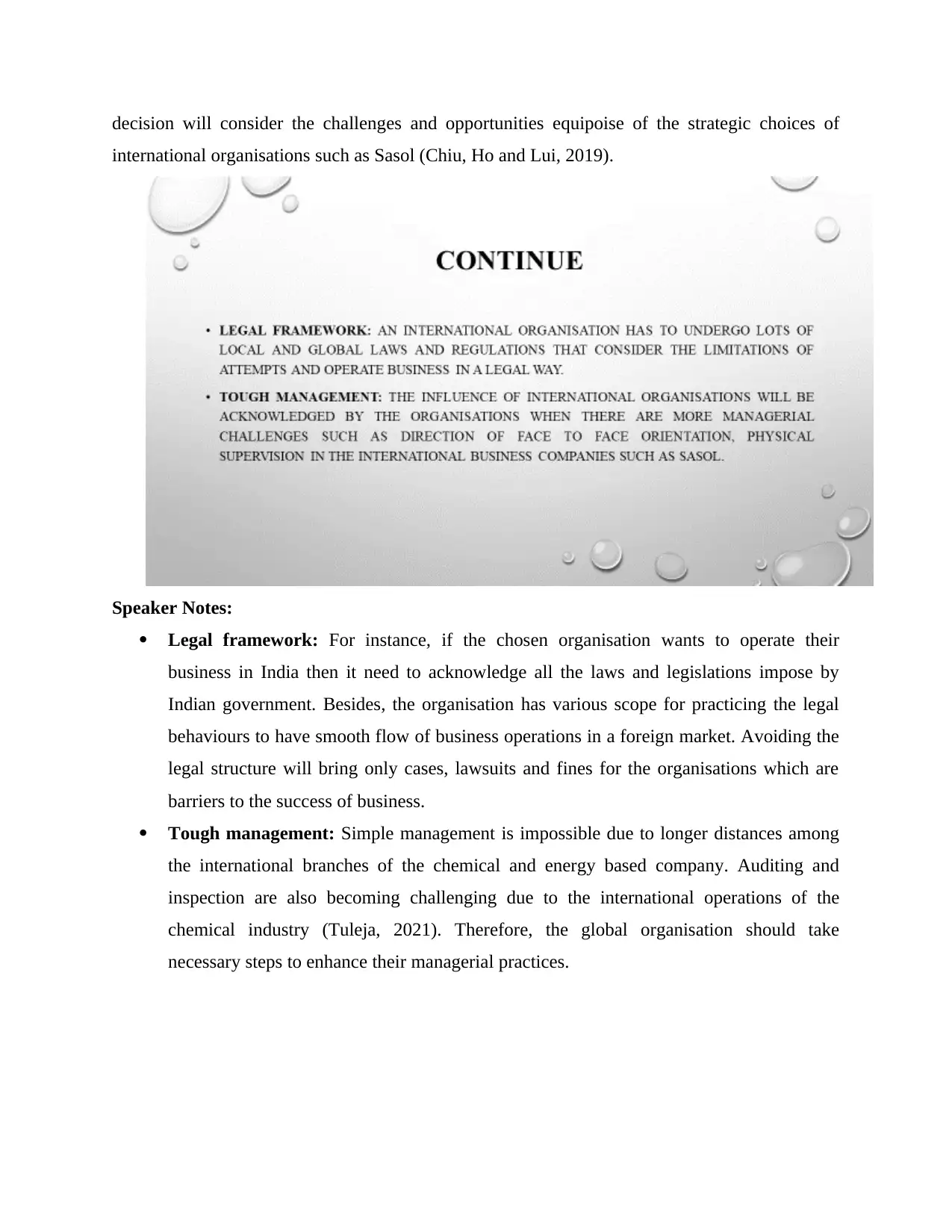
decision will consider the challenges and opportunities equipoise of the strategic choices of
international organisations such as Sasol (Chiu, Ho and Lui, 2019).
Speaker Notes:
Legal framework: For instance, if the chosen organisation wants to operate their
business in India then it need to acknowledge all the laws and legislations impose by
Indian government. Besides, the organisation has various scope for practicing the legal
behaviours to have smooth flow of business operations in a foreign market. Avoiding the
legal structure will bring only cases, lawsuits and fines for the organisations which are
barriers to the success of business.
Tough management: Simple management is impossible due to longer distances among
the international branches of the chemical and energy based company. Auditing and
inspection are also becoming challenging due to the international operations of the
chemical industry (Tuleja, 2021). Therefore, the global organisation should take
necessary steps to enhance their managerial practices.
international organisations such as Sasol (Chiu, Ho and Lui, 2019).
Speaker Notes:
Legal framework: For instance, if the chosen organisation wants to operate their
business in India then it need to acknowledge all the laws and legislations impose by
Indian government. Besides, the organisation has various scope for practicing the legal
behaviours to have smooth flow of business operations in a foreign market. Avoiding the
legal structure will bring only cases, lawsuits and fines for the organisations which are
barriers to the success of business.
Tough management: Simple management is impossible due to longer distances among
the international branches of the chemical and energy based company. Auditing and
inspection are also becoming challenging due to the international operations of the
chemical industry (Tuleja, 2021). Therefore, the global organisation should take
necessary steps to enhance their managerial practices.
Paraphrase This Document
Need a fresh take? Get an instant paraphrase of this document with our AI Paraphraser
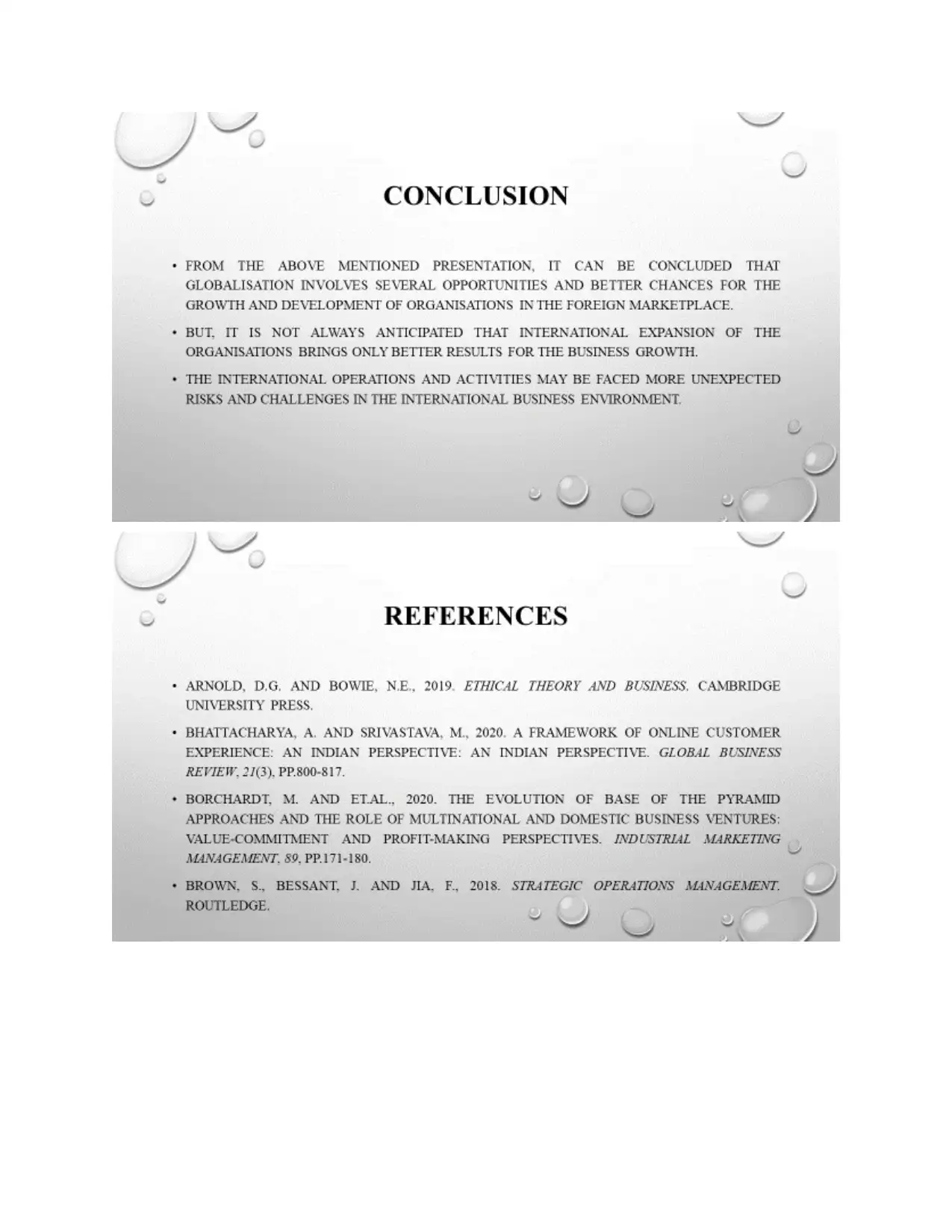
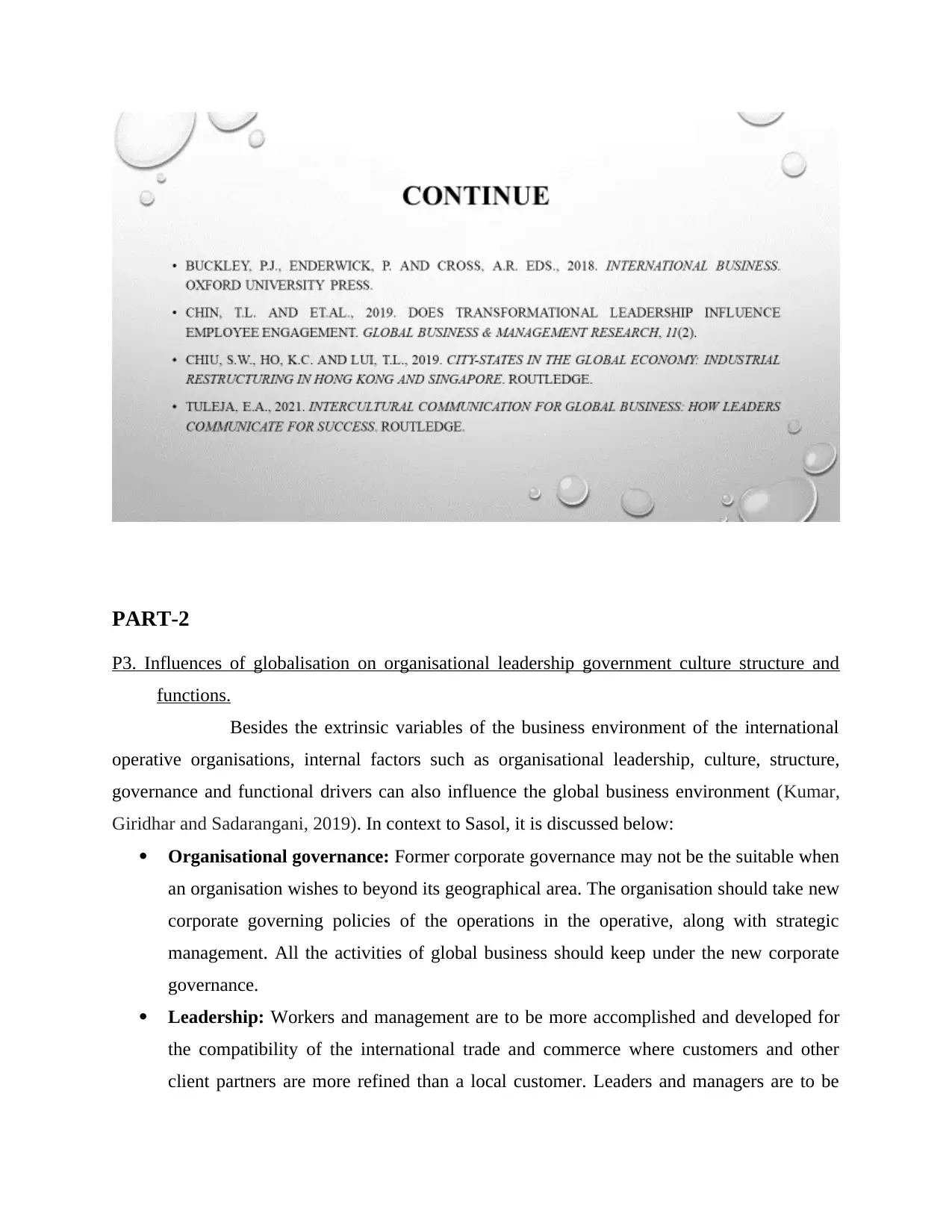
PART-2
P3. Influences of globalisation on organisational leadership government culture structure and
functions.
Besides the extrinsic variables of the business environment of the international
operative organisations, internal factors such as organisational leadership, culture, structure,
governance and functional drivers can also influence the global business environment (Kumar,
Giridhar and Sadarangani, 2019). In context to Sasol, it is discussed below:
Organisational governance: Former corporate governance may not be the suitable when
an organisation wishes to beyond its geographical area. The organisation should take new
corporate governing policies of the operations in the operative, along with strategic
management. All the activities of global business should keep under the new corporate
governance.
Leadership: Workers and management are to be more accomplished and developed for
the compatibility of the international trade and commerce where customers and other
client partners are more refined than a local customer. Leaders and managers are to be
P3. Influences of globalisation on organisational leadership government culture structure and
functions.
Besides the extrinsic variables of the business environment of the international
operative organisations, internal factors such as organisational leadership, culture, structure,
governance and functional drivers can also influence the global business environment (Kumar,
Giridhar and Sadarangani, 2019). In context to Sasol, it is discussed below:
Organisational governance: Former corporate governance may not be the suitable when
an organisation wishes to beyond its geographical area. The organisation should take new
corporate governing policies of the operations in the operative, along with strategic
management. All the activities of global business should keep under the new corporate
governance.
Leadership: Workers and management are to be more accomplished and developed for
the compatibility of the international trade and commerce where customers and other
client partners are more refined than a local customer. Leaders and managers are to be
⊘ This is a preview!⊘
Do you want full access?
Subscribe today to unlock all pages.

Trusted by 1+ million students worldwide
1 out of 18
Related Documents
Your All-in-One AI-Powered Toolkit for Academic Success.
+13062052269
info@desklib.com
Available 24*7 on WhatsApp / Email
![[object Object]](/_next/static/media/star-bottom.7253800d.svg)
Unlock your academic potential
Copyright © 2020–2026 A2Z Services. All Rights Reserved. Developed and managed by ZUCOL.
